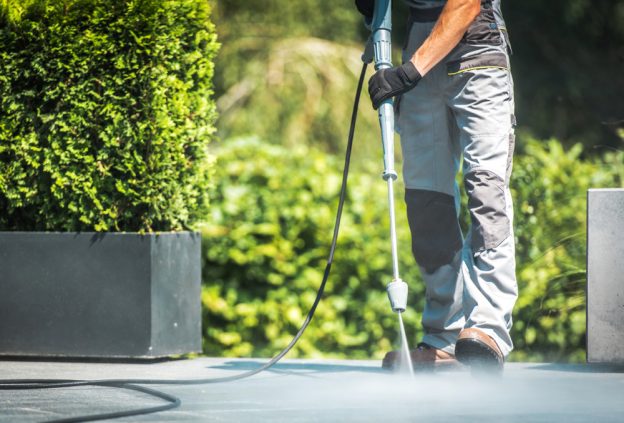Pressure washers are used for many reasons during the summer, from power washing your driveway to cleaning your car’s exterior. This guide is a must-read for anyone who is planning on using a petrol or diesel pressure washer anytime soon. When it comes to using petrol and diesel pressure washers, there are a few things to keep in mind. Whether it’s your first time operating one, or your hundredth time, there is no harm in building or refreshing your knowledge on the basics. You might learn something you didn’t know before, so continue reading to find out more.
Always Wear PPE & Safety Gear
It is essential to always wear PPE (personal protective equipment) and safety gear when using a petrol or diesel pressure washer. This includes waterproof overalls, helmets, heavy-duty gloves, ear protection, safety goggles and closed-toed boots. Wearing these items during power washing can protect you from high-pressure sprays. Failure to do so could result in skin burns, cuts, bruises, or eye damage.
Check Oil & Fuel Levels
Once you have PPE on, we can continue getting the pressure washer ready for use. Next, it’s essential to check the oil and fuel levels before turning it on. This ensures the pressure washer has the right amount of oil and fuel to run smoothly and efficiently. Running the pressure washer on low oil or fuel levels can cause engine damage, either by overheating it or causing a malfunction.
Use A Suitable Detergent
Once the oil and fuel levels are accurate, detergent needs to be added to the tank if necessary. Sometimes, water alone or normal detergents you find in the home won’t cut through the thick grease or dirt. In this case, it’s recommended to use an industrial detergent suitable for your pressure washer and the task at hand. For instance, all vehicles require a specially formulated car cleaner, as they are formulated to remove dirt without damaging any paintwork. For trucks, vans and buses, use a traffic film remover to lift off heavy road grime. Ensure to follow the directions on the detergent container, as some solutions may need to be diluted with water beforehand.
Connect To The Water Supply
Next, the pressure washer needs to be connected to a water supply. This will draw the water into the pump and create a high-pressure spray required for heavy-duty cleaning. With a water supply, you will not be able to produce such a high-pressure spray. To ensure a constant flow of water, make sure the water supply is turned on before proceeding. Make sure there is no water leaking from the hose. Never use the pressure washer with the water supply turned off, unless you are finished using it and need to disconnect the hose.
Allow It To Warm Up
When the pressure washer is turned on, it should be allowed to warm up before going ahead with your power washing duties. This will help the engine to warm up and run smoothly. Not only that, but it will allow the oil to circulate through the engine and the pump properly and prevent other problems from happening when used straight away while the engine is cold.
Hold The Nozzle Correctly
Make sure to hold the nozzle a safe distance away from direct contact with the surface. This ensures the surface is cleaned efficiently without causing damage. For best results, move the nozzle in a sweeping motion, rather than in a zig-zag or other pattern. Do not hold the nozzle in the same spot for a long period of time, as this can cause small dents or marks on the surface. For obvious safety reasons, never point the nozzle towards another person or animal.
Adjust The Pressure & Flow
Depending on the task at hand, you will need to adjust the pressure and flow rate of the pressure washer. Higher pressure is more suitable for tougher cleaning surfaces such as concrete. Lower pressure is better for more delicate surfaces such as vehicles and garden furniture. You may think a higher pressure will clean better, however, using a higher pressure setting on a delicate surface can do more harm than good. For instance, it could remove paintwork and cause small dents on the body of the vehicle, leaving it vulnerable to rust. Once you’re finished using the pressure washer, make sure to turn it off, disconnect it from the water supply and store it in a secure and dry place.
Petrol & Diesel Pressure Washers From Britclean
At the end of the day, a petrol or diesel pressure washer is a type of machinery and it needs to be handled with caution and used correctly. At Britclean, we supply and maintain a wide range of petrol and diesel pressure washers. We only choose to fit our pressure washers with high-quality engines from leading brands including Honda, Karcher, Ehrle, Nilfisk and so on. This means whatever pressure washer you choose from us, it’s guaranteed to give high cleaning power and durability. If you’re interested in hiring or purchasing a pressure washer from us and for any enquiries, please contact us today.

